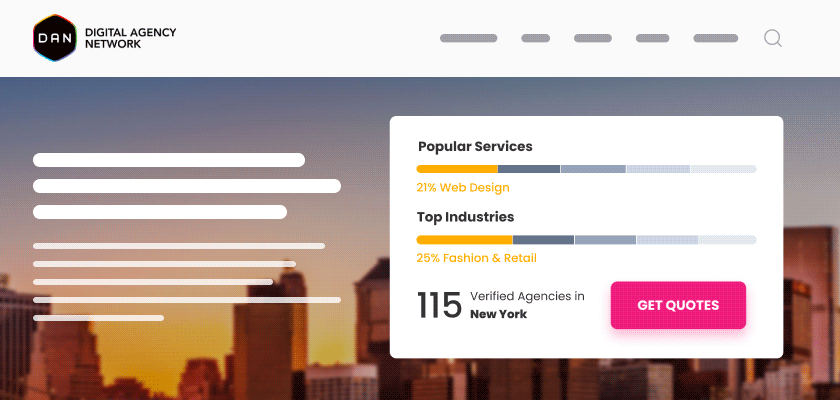Are you ready to revolutionize your marketing strategy? Start implementing AI today to stay ahead in the digital age.
No doubt that the future of marketing is data-driven and 88% of marketers agree that increasing AI adoption is crucial to meeting customer expectations and staying competitive.
The digital marketing world has already started transforming and artificial intelligence (AI) is at the forefront of this change for sure. As brands and digital agencies strive to stay competitive in this monumental shift, adopting AI-driven strategies has become not just advantageous but essential.
In this article, we’ll explore how AI can be leveraged for digital agencies and brands to enhance their marketing efforts by using data-driven insights to create more effective, personalized, and engaging marketing campaigns.
Let’s get started!
The Role of AI in Modern Marketing
AI isn’t just a buzzword; it’s a game-changer. In fact, 54.5% of marketers already see AI greatly enhancing their marketing efforts as stated in the benchmark report.
AI in marketing refers to using intelligent and machine learning algorithms to analyze vast amounts of data, predict trends, and automate decision-making processes. It enables marketers to understand their audience on a deeper level, personalize customer experiences, optimize their marketing campaigns, and tailor their strategies accordingly. As a result, it gives marketers a powerful edge to engage customers and boost conversions. While integrating AI into your marketing, there are two topics you should keep in mind: responsible use and ethical considerations.
The Impact of AI on Consumer Behavior
Consumer buying behavior is likely to be impacted by personalization driven by AI. Personalization can only be achieved if user behavior through data analysis, including demographics, online activity, and psychometrics, is understood deeply. By doing that, AI can help agencies and brands predict future actions and recommend relevant products or services to customers. That will potentially lead to improved conversion rates, customer lifetime value (CLV), and return on investment (ROI).
Recent studies confirm that AI-powered recommendations can influence consumer behavior significantly. For instance, a report by McKinsey & Company highlights that personalization strategies, driven by AI, can reduce acquisition costs by up to 50%, increase revenues by 5-15%, and improve the efficiency of marketing spend by 10-30%.
Data-Driven Strategies for Implementing AI
Leveraging Predictive Analytics
Predictive analytics turn raw data into actionable insights for marketing purposes. AI technology can perform better than humans in analyzing large data sets. Since agencies and brands need to answer rapidly changing customer preferences and market trends, speed is everything.
AI powered predictive analytics enables hyper-personalization in every aspect of marketing. Brands can implement AI technology to predict customer needs and preferences to create customized targeting strategies.
Let’s take an example: Netflix. Promise, I am not going to suggest anything relevant to your preferences – because Netflix does it for me!

Netflix uses predictive analytics to give recommendations on the shows and movies you have already watched by only using the AI’s power. Their personalization strategy is based on offering users exceptional experience, even they can do it with their social channels.
Not just Netflix, Starbucks uses its AI-driven “Deep Brew” app to offer personalized ordering suggestions, new product creations, and new store locations through their app.

Analyzing a huge amount of data on customer spending and preferences helped Starbucks personalize the customer experience for every customer based on their unique preferences and spending habits. By doing that, the coffee giant has significantly increased customer engagement and sales.
Enhancing Customer Experience with Chatbots
AI-powered chatbots have helped the customer experience technology a rapid step forward. These chatbots use machine learning and natural language processing methods to generate human-like responses. Besides 24/7 customer support, they handle inquiries and offer personalized recommendations instantly to enhance user experience.
Nowadays, it’s possible to see examples from different industries from banking to airlines. No need to go far, well-known brands like H&M use chatbots to offer beauty advice and fashion recommendations through its Kik chatbot. It’s like a messenger app that focuses on improving customer satisfaction and loyalty.
Optimizing Content with AI
When AI technology meets smart techniques, it can polish up digital content. A super-brain reads tons of data to understand what people love and what search engines want. Additionally, it analyzes words, structure, and how it looks online, then suggests ways to make it amazingly engaging for the audience.
There are various AI content tools to help marketers optimize their content strategy, and improve their SEO and engagement rates. Implementing these tools feels like having a personal assistant who knows all the tricks to make content shine.
AI content optimization offers impressive benefits like personalization, improved SEO, faster creation, and real-time analysis. While not replacing humans, it assists marketers with tasks and enhances quality. However, there are some challenges in using AI in content optimization that include concerns about complete automation, lack of personalization, and quality. These can be addressed with proper understanding and application. Several effective techniques like utilizing NLP, AI-powered keywords, personalization, and voice search optimization are available to maximize its potential.
Ethical Considerations and Challenges
As AI becomes increasingly integrated into digital marketing, both agencies and brands face a range of ethical considerations and challenges. Here are some key areas to be aware of:
Data Privacy and Security
Great power comes with great responsibility. Prioritizing data privacy is essential for building customer trust. Around 87% of consumers say they wouldn’t engage with a brand if they had concerns about its privacy practices. That’s why brands and agencies face data regulations based on their geolocation nowadays. Before implementing any AI marketing tools, it would be better to search for processes to monitor the compliance of the customer data set.
Since AI applications often rely on vast amounts of personal data, agencies and brands must ensure responsible data collection, storage, and usage, complying with relevant regulations and respecting user privacy.
Bias and Fairness
AI algorithms can inherit and amplify biases present in the data they are trained on. This can lead to discriminatory results in areas such as ad targeting, content moderation, and personalized recommendations. Solving this problem requires the examination of diverse data sets, tight control, and human oversight.
Transparency and Explainability
It’s often difficult to understand what the AI model is doing, how it came to the conclusions, and why it did what it does. It’s fairly challenging to explain how these massive language models work. Consumers mostly want to know how it is being used by a brand, why it is being used and how will it impact their interactions with the brand. If they feel a lack of transparency, that will lead to a lack of trust in brands.
Let’s take an example;
Robert Masson, neurosurgeon & CEO of medical tech company eXpanded eXistence, has developed an AI-powered surgery app called eXeX. Masson was aware of not only opportunities but also risks.

Surgical tools, while potentially risky in untrained hands, can become powerful instruments for healing and renewal when wielded by skilled professionals. Masson emphasizes education, training, and experience as crucial factors in unlocking this potential. He believes transparency and proper training are essential for responsibly using this technology in our ever-changing world.
Job Displacement and Human Agency
AI might replace certain jobs in marketing in the coming years and create millions of displaced workers. However, it’s also expected to generate new opportunities. Researches suggest that by 2030, AI could eliminate 375 million jobs globally, but also create 97 million new ones. The catch is that these new roles will demand different skills and might be in entirely different sectors than the replaced ones. At this point, adapting to the existing job market highlights the importance of retraining and upskilling workers.
Getting Started with AI in Marketing
Define Your Needs and Capabilities
Before getting started with AI, it’s crucial to understand current marketing strategies and pain points to identify areas where AI can add value. Brands need to figure out how AI can personalize customer experiences, optimize marketing efforts, and unlock valuable insights, while agencies require a deeper understanding of various AI techniques to proactively advise clients and develop effective solutions. So, aligning AI solutions with specific needs ensures a targeted approach and maximizes ROI.
Choose the Right AI Tools
It’s also vital to choose the right AI marketing tools and platforms that align with your marketing objectives. Whether it’s for content optimization, predictive analytics, or customer engagement, there’s a plethora of AI solutions available. Before investing in any of them, you need to conduct thorough research to identify solutions that align with your goals, budget, and technical expertise.
Start Small and Experiment
Implementation of AI doesn’t happen overnight. It requires time and attention, so you should begin with targeted initiatives instead. This could be utilizing AI-powered audience segmentation platforms to understand your customer base better. Or, test a chatbot solution to handle basic customer inquiries, saving your team’s time for more strategic engagements.
Focus on Data Quality and Ethics
AI is only as good as the data it feeds on. High-quality data can help brands and digital agencies provide more accurate insights into their decision-making processes. This can also lead to provide better user experiences and create new revenue streams.
To avoid biased algorithms and inaccurate results, they need to ensure data is clean, organized, and ethical. They also need to be transparent about their use of AI to build customer trust.
Upskill Your Team
Investing in training your team on AI fundamentals empowers them to leverage its potential.
Attending AI events, from workshops and conferences to online courses and internal knowledge-sharing sessions, can bridge the gap and equip them with the fundamental knowledge and skills they need.
Collaborate with AI Experts
Partnering with AI marketing agencies or consultants specializing in AI marketing can provide invaluable guidance and accelerate the implementation process. From AI-powered customer segmentation and targeting to social media listening and sentiment analysis, these agencies ensure a successful integration of AI into your existing marketing strategy.
If you are looking for an agency but don’t know where to start, you’re welcome here At DAN! The Get Quotes is a straightforward process where brands share their needs, budgets, and project specifics through agency directories. Our team of experts reviews each request with great attention and precision. Then we match the project with the most suitable agencies, serving as the bridge between forward-thinking agencies and discerning brands. So, what are you waiting for?

Focus on Human & AI Collaboration
No doubt that AI will not be able to replace human marketers. It can only augment their abilities. Using AI for repetitive tasks, data analysis, or content generation will remain but the human touch for strategic decision-making, ethical considerations, or emotional intelligence will always be demanded.
Last Words
AI marketing is no longer a futuristic concept but a present-day necessity. By embracing AI-driven strategies, digital agencies and brands can unlock unprecedented levels of personalization, efficiency, and engagement.
The journey begins with understanding your needs, choosing the right tools, and continuously optimizing your approach.
